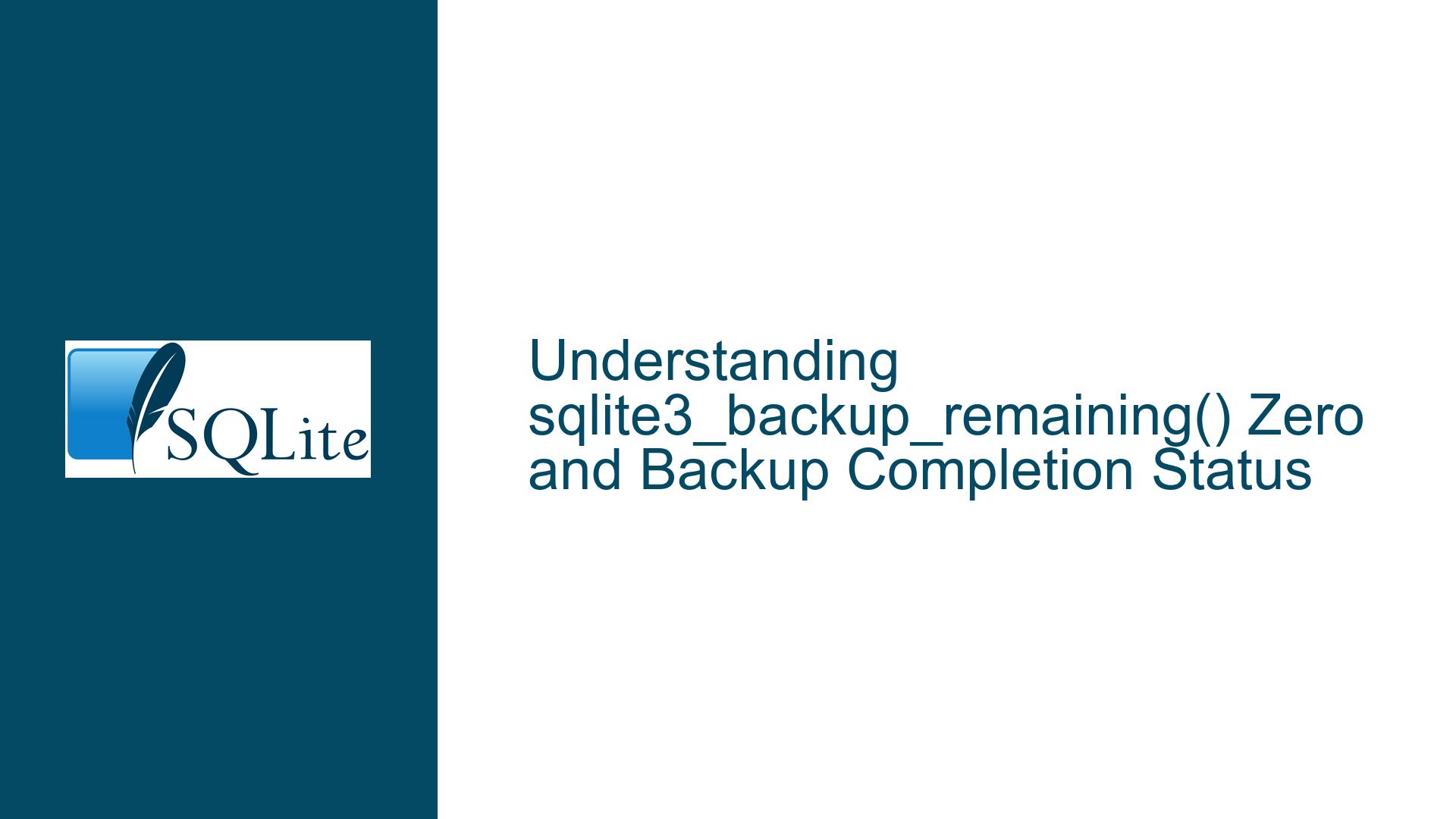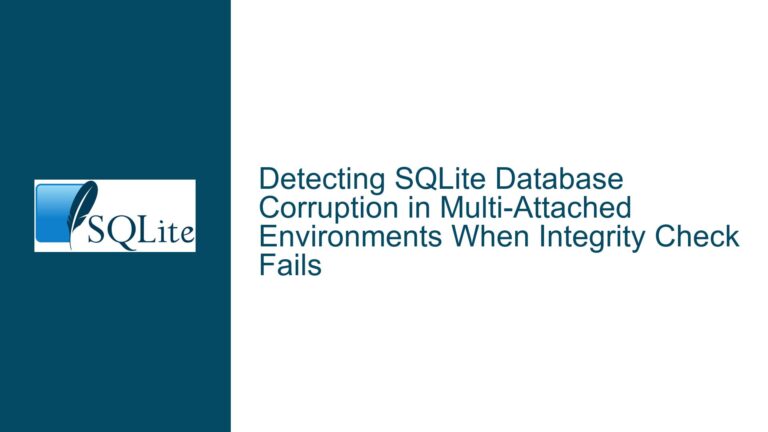sqlite3_backup_remaining() Zero and Backup Completion Status
Decoding the Relationship Between Backup Progress Tracking and Completion Signaling
The SQLite Backup API provides developers with a powerful mechanism to create online backups of databases. Two critical functions in this API—sqlite3_backup_step() and sqlite3_backup_remaining()—are central to understanding backup progress and completion. However, their interplay often leads to confusion, particularly around whether a return value of 0 from sqlite3_backup_remaining() guarantees that the backup process has concluded (as signaled by sqlite3_backup_step() returning SQLITE_DONE). This issue is not merely academic; misinterpreting these signals can lead to incorrect assumptions about backup integrity, premature resource releases, or flawed progress reporting in applications.
At the heart of this confusion lies the distinction between page-level copying progress and transactional finalization. The Backup API operates by copying database pages from the source to the destination database in discrete steps. sqlite3_backup_remaining() returns the number of pages remaining to be copied at any given time. When this value reaches 0, it indicates that all pages have been transferred. However, this does not necessarily mean the backup is fully committed to the destination database. The final transactional commit—ensuring atomicity and durability—occurs during the last call to sqlite3_backup_step(), which returns SQLITE_DONE. This subtlety is critical: a backup is only complete and durable when sqlite3_backup_step() returns SQLITE_DONE, regardless of sqlite3_backup_remaining()’s value.
The implications of this behavior are far-reaching. Consider an application that uses a progress callback to report backup status. If the callback relies solely on sqlite3_backup_remaining() == 0 to signal completion, it may incorrectly notify users before the destination database has been fully committed. Similarly, a developer might prematurely call sqlite3_backup_finish() upon seeing a zero remaining page count, risking an incomplete backup. These scenarios underscore the necessity of understanding the Backup API’s state transitions and the guarantees (or lack thereof) provided by its functions.
Why sqlite3_backup_remaining() Zero Does Not Guarantee Backup Finalization
The root cause of this ambiguity lies in the Backup API’s design and SQLite’s transactional model. When sqlite3_backup_step() is called repeatedly, it performs two primary tasks: copying pages from source to destination and managing transactions on the destination database. The page copying occurs incrementally, with sqlite3_backup_remaining() decrementing as pages are transferred. However, the final step involves committing the transaction on the destination database, which may involve additional I/O operations such as flushing writes to disk. This final commit is atomic—it either fully succeeds or fully fails—and is tied to the SQLITE_DONE return value from sqlite3_backup_step().
A zero value from sqlite3_backup_remaining() indicates that all pages have been copied but does not account for the transactional overhead of finalizing the backup. This separation of concerns exists because SQLite prioritizes atomicity and durability. For example, if a power failure occurs after the last page is copied but before the transaction is committed, the destination database must remain in a consistent state. By deferring the commit to the final sqlite3_backup_step() call, SQLite ensures that the backup is either fully applied or not applied at all, avoiding partial states.
Another factor is the API’s granularity. The Backup API allows developers to control how much work is done in each sqlite3_backup_step() call via the nPage parameter. This design enables incremental backups that don’t block other database operations for extended periods. However, it also means that the last call to sqlite3_backup_step() might involve both copying the final pages and committing the transaction. If a developer interrupts the process after sqlite3_backup_remaining() returns 0 but before the final sqlite3_backup_step() completes, the backup remains uncommitted and unusable.
Implementing Robust Backup Completion Checks and Progress Reporting
To avoid the pitfalls associated with misinterpreting sqlite3_backup_remaining(), developers must adhere to the Backup API’s state machine rigorously. The following principles and practices ensure reliable backup handling:
Treat
SQLITE_DONEas the Sole Completion Signal
The only authoritative indicator of backup completion is theSQLITE_DONEreturn value fromsqlite3_backup_step(). Regardless ofsqlite3_backup_remaining()’s value, continue callingsqlite3_backup_step()until it returnsSQLITE_DONE. This guarantees that all transactional operations (including the final commit) have completed.Example workflow:
sqlite3_backup *pBackup = sqlite3_backup_init(dest_db, "main", source_db, "main"); if (pBackup) { do { rc = sqlite3_backup_step(pBackup, 5); // Copy 5 pages per step int remaining = sqlite3_backup_remaining(pBackup); report_progress(remaining); } while (rc == SQLITE_OK || rc == SQLITE_BUSY || rc == SQLITE_LOCKED); if (rc == SQLITE_DONE) { // Backup completed successfully } sqlite3_backup_finish(pBackup); // Always call finish() }Design Progress Callbacks with Explicit Completion Flags
When implementing progress callbacks, include a parameter that explicitly indicates whether the backup has reached theSQLITE_DONEstate. Avoid inferring completion fromsqlite3_backup_remaining() == 0.Correct callback signature:
void backup_progress(int remaining, int total, bool done);Invoke this callback after each
sqlite3_backup_step()call, passingdone = (rc == SQLITE_DONE).Handle Transaction Rollbacks and Interruptions Gracefully
Ifsqlite3_backup_step()returns an error code other thanSQLITE_BUSYorSQLITE_LOCKED, the backup process has failed, and the destination database’s transaction will be rolled back. Always check the return value and handle errors appropriately. Do not assume the destination database is valid unlessSQLITE_DONEwas returned.Avoid Premature Resource Release
Thesqlite3_backupobject retains critical state information untilsqlite3_backup_finish()is called. Even ifsqlite3_backup_remaining()returns0, failing to callsqlite3_backup_finish()will leak memory and potentially leave the destination database in a locked state.Benchmark and Adjust Page Copying Granularity
ThenPageparameter insqlite3_backup_step(pBackup, nPage)controls how many pages are copied per step. Smaller values improve responsiveness but increase the number of steps required. Larger values reduce overhead but may cause noticeable delays. Profile your application to find an optimal balance, but ensure that the final step (which commits the transaction) is allowed to complete uninterrupted.
By internalizing these practices, developers can leverage the SQLite Backup API effectively while avoiding the subtle bugs that arise from misinterpreting progress indicators. The key takeaway is unambiguous: sqlite3_backup_remaining() == 0 is a necessary but insufficient condition for backup completion. Only sqlite3_backup_step()’s return value provides the definitive signal that the backup has been atomically committed and is ready for use.






